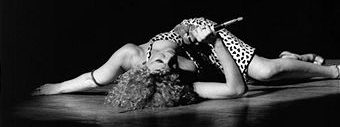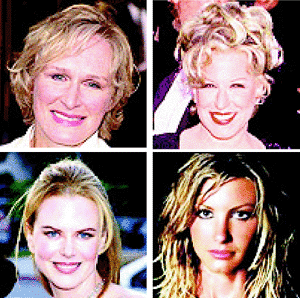Slant Magazine
The Rose
BLU-RAY REVIEW
4.5 out of 5
BY CLAYTON DILLARD ON MAY 20, 2015
The Rose is a prestige studio film that wants to be mistaken as a cry from the bowels of hell, as an authentic, gritty depiction of the tribulations and toll of fame. The film is anchored by an unbridled lead performance from Bette Midler as the titular rocker, whose legion of fans gravitate to her on-stage presence without realizing the consequences of their devotion. Director Mark Rydell and screenwriters Bo Goldman and Bill Kirby construct a fictional character and scenario that have resonances with the lives of musicians like Janis Joplin and Jimi Hendrix, which were prematurely ended by the same circumstances facing Rose. In effect, that’s part of the film’s problem: It’s too busy lamenting the consequences of myth to realize that its fetishizing of suffering as part of the artistic process only furthers the myth. Although the film opens with a handful of reporters barging into Rose’s childhood home, seeking answers to why her career came to such an abrupt end, the filmmakers display little interest in deconstructing or interrogating the cult surrounding feminine pursuits of stardom (Gus Van Sant‘s To Die For is perhaps the best instance in American filmmaking of this kind of critique).
The lack of a cunning and incisive erosion of myth is softened by proficient narrative textures that bolster the film’s bid for hands-on filmmaking, most notably through interactions between Rose, her manager Rudge (Alan Bates), and lover Huston (Fredric Forrest), all of whom Rydell efficiently characterizes through terse dialogue and telling actions. When Rose explains to Rudge that she’s thinking of taking a year off, the interaction is fast and without context; the characters never slip into explaining themselves or stating information that would already be readily familiar to both of them. The exchange is Cassavetes-esque, but Rydell stages it inside of a high-rise, overlooking the streets of Manhattan, adding simplistic visual appeal. Cinematographer Vilmos Zsigmond shoots these evenly lit interiors with the same intimacy that’s given to the film’s extensive concert sequences, though the performances are a much wilder, untamed beast, offering the crowd, the stage, and Rose with a characterizing intent that isn’t simply out to revel in the spectacle. After all, The Rose is a period piece, set in 1969, so that when Rose tells an audience to keep preaching “drugs, sex, and rock n’ roll,” it’s an immediately suspicious assessment of the ethos of an era where apathy and bodily indulgence rules.
And yet, The Rose is a little late on the draw in its cynicism, almost a decade behind “We blew it” from Easy Rider, or even the indifferent teens of Halloween from a year prior. Rose makes little assessment of politics, and neither do any of her friends and crew. A key scene with established singer Billy Ray (Harry Dean Stanton), in which he bluntly tells her not to cover any more of his music, is the closest Rose comes to confronting herself as an aesthetic, as an artistic choice that fits into a larger tapestry of cultural and social conflict. Similarly, the filmmakers are content to allow the contexts of the period to remain on the periphery; Vietnam shows up sparsely, like when a background radio is heard addressing the conflict or Huston’s divulgence of having been in the army. Yet compared to its New Hollywood brethren, especially in seminal films like Taxi Driver and Nashville, where politics and worries of war are firmly rooted within the proceedings, little about The Rose rises to such a level, instead emphasizing melodramatic conflict and its cast’s method acting chops.
On that front, Midler’s performance comprises the bulk of the film’s appeal, especially considering nearly all of the concerts were recorded live, with minimal post-production alterations. On stage, as shot by Zsigmond and a host of other well-known cinematographers that were brought on for the shoot, Midler’s mobility and energy are captured in monochromatic reds and blues, almost too finely rendered for a film that wants to constantly assert its working-class ferocity. To the filmmakers’ credit, they let Rose sing two or three songs in a row, without interruption, not just in the film’s nearly half-dozen concert scenes, but even when she’s off stage, as in a lengthy drag-club sequence. Long takes are used frequently, whether in a seven-minute exchange between Rose and Huston in bed or a staggering high-angle shot that frames Rose in front of a football field while using a payphone, before craning down to capture her in close-up. These visual cues, along with Midler’s presence, give the film an immediacy and dynamism, but the end result is rather superficial, myth-driven, and awards-bait-y, best epitomized by Rydell’s decision to use Amanda Broom’s track “The Rose” over the end credits, perhaps the most surefire way to glimpse the film’s rather thorn-less core.
IMAGE / SOUND:
The digital 4k restoration and DTS-HD audio mix give this transfer of The Rose new, vivacious life that Fox’s 2003 DVD only hinted at. Colors and sounds are much sharper than before, especially in the concert sequences, despite being shot with nine separate cameras over the span of two full-runs each, are no less luminous than the more intimately composed backstage or hotel scenes. Reds and blacks are delicately balanced, allowing for Vilmos Zsigmond’s cinematography to achieve a fluidity that Criterion has taken ample care to preserve. Even more impressive, perhaps, is the audio track, which boasts a depth and fullness that reminds just how much of a behemoth Mark Rydell’s film can be when it’s fully immersed within the confines of its sonic soundscapes, anchored by Bette Midler’s ample bravado.
EXTRAS:
There are a plethora of insights from various members of the cast and crew, though the dearth of appraisals from either critics or historians gives the supplements an unwanted, hagiographic tinge that also accompanied Criterion’s release of The Big Chill. A commentary by Rydell is informative to an extent, as he recounts how the film came into being at 20th Century Fox; though The Rosewas originally conceived as a Janis Joplin biopic, he was adamant that it shouldn’t be seen as such. Rydell also talks up Midler’s performance, explaining how the impressive concert scenes were shot and championing his film as an example of the kinds of challenging material Hollywood studios were making in the ’70s. However, Rydell also disappears from the track numerous times, sometimes dropping out to let the film play for several, uninterrupted minutes. As such, the track would’ve been put to better use as a video essay or interview, the latter of which is alsoincluded, and proves somewhat redundant as Rydell explains to filmmaker Charles Dennis several of the same stories/tidbits already available in the commentary. The remaining interviews with Midler and Vilmos Zsigmond are informative, but a bit too light in terms of insight. Midler explains how she was initially opposed to the project because she was uninterested in tampering with Joplin’s legacy, before describing her movements in the film as panther-like and remembering how encouraging Rydell remained throughout the extensive production. Zsigmond discusses how he filmed the concert scenes and kept Midler in frame throughout, while also divulging the logistics behind lighting 10,000 people during a helicopter shot and his preference for anamorphic framing over 16 or 35mm. Also included are two brief segments from The Today Show following the film’s theatrical release and a booklet with an essay by Paula Mejia that explores more of the film’s historical background, including the idea that Rose is a “composite” of several rock stars and celebrities from the 1960s.
OVERALL:
The Rose looks and sounds incredible on the new Blu-ray from the Criterion Collection, though more adventurous viewers may yearn for some thornier supplements.










